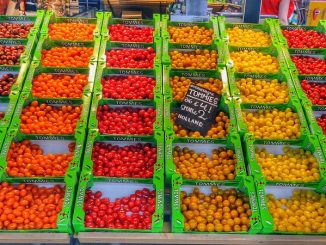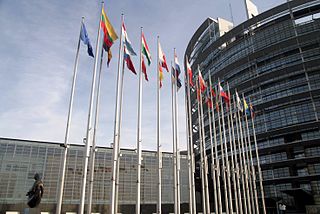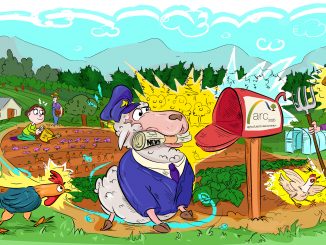
This week saw an unsuccessful last-ditch attempt to push the EU’s proposal to loosen rules on gene editing over the finish line, leaving the plans on ice. Meanwhile, it’s all been Politics with a capital P as Belgium prepares to hand the presidency over to Hungary, while leaders jostle for Brussels’ top jobs and considerations start on redrawing the lines of the European Parliament’s committees – a shake up which could have big impacts on the way agriculture files are handled. Natasha Foote and Oliver Moore bring you the latest from Brussels.
No-go for new GMOs
Inspired perhaps by the somewhat unexpected though suitably epic passing of the Nature Restoration Law, Belgium aimed to finish off its time at the helm of the EU rotating presidency with a greenlight on the NGTs file.
New genomic techniques (NGTs) – also known as gene editing or new GMOs – describe several scientific methods used to alter genomes and genetically engineer certain traits into plants.
The EU had put forward plans to loosen rules on these technologies back in July, 2023. And while the Parliament sealed their position on the plans back in February, things have been more complicated over in the Council where it has been stuck at an impasse for months over the sticky issue of patents.
A last ditch attempt was mounted by the Belgians, who put forward a new text which aimed to make it easier for new trials on NGT 1 plants. Poland remained the main target of efforts, as that particular greenlight would just be enough to win the requisite level of support.
However, despite “trying everything [they] could” in order to reach the necessary majority, the Belgians were not able to seal the deal, according to a representative for the Presidency, who told ARC that discussions were taken off the agenda of a technical meeting this week, originally scheduled for Wednesday (26 June).
The move comes on the back of warnings against rushing through the legislation from European organisations, including environmental NGOs, farmers and beekeepers, who together released a joint statement calling for a “robust and scientifically based regulation” for the technology, as well as mandatory risk assessments in each case and stringent monitoring for all plants after being introduced into the market.
Earlier work on the file was turbocharged as part of a sweetener deal to help garner support for the EU’s plans to slash the use and risk of pesticides. But after this was killed off, some, such as Euronews’ Gerardo Fortuna, pointed out that a pause to sort out the patents might have restarted momentum.
“Parliament has asked for the total non-patentability of NGTs, we will not be able to accept half a measure, especially an inapplicable one,” Socialist MEP Christophe Clergeau, who will continue to represent the socialists in negotiations on this text, said, pointing out that “all the political groups in Parliament” opposed the patentability of new GMOs. “Such unanimity is rare enough to be defended!” he said.
Previously, one diplomat – who spoke on the condition of anonymity – told ARC that, in the event that both lawmakers agree to include a ban on patents on NGT plants, the Commission has said it will “withdraw the whole file”.
Meanwhile, the European Food Safety Agency (EFSA) is gearing up to publish a new opinion on the categorisation of NGTs following reports from multiple national agencies calling into question the scientific validity of the proposed criteria. The agency promised this new opinion by July 2024, and sources say that EFSA has already adopted the opinion, which is now being fine-tuned before publication, expected in the first half of July – something to watch in the coming weeks.
However, ultimately things are unlikely to move ahead over the next 6 month period, when Belgium will hand the reins of the rotating EU presidency over to Hungary, which opposes the legislation. This means the file will likely be put on ice, at least for the next 6 months.
Belgian (waffles) and Hungary (mouths)
Wrapping up its six month term, the Belgian presidency released its conclusions on the future of agriculture in the EU. This is in advance of the Council’s Strategic Agenda conclusions coming very soon and Strategic Dialogue conclusions arriving in September.
Belgian conclusions Future of Agriculture
A now familiar refrain of competition, innovation and admin burden is joined by young farmers and finally “resilience to climate change and preservation of the environment” as the five main sections in the conclusion.
Here, it mirrors much of the focus in documents such as the Strategic Dialogue we leaked some weeks back – back to the future with a focus on competition and innovation, just like before the Green Deal started to make its mark.
That final section does at least include reference to both adaptation and mitigation, while much is made of the need for new and private money.
In a similar vein, the Hungarian Presidency’s outline for its work in the coming months prioritises a more chastened environmental focus and the prioritisation of agri and industrial needs.
Read the Hungarian Presidency Programme and Priorities
With some top drawer trolling (Make Europe Great Again as the official slogan of the Presidency; a new European Competitiveness Deal sounding eerily like a replacement for a stagnant, out of favour European Green Deal) the focus will be on “a competitive, crisis-proof and farmer-friendly agriculture… while there will be “a rational balance regarding the strategic objectives of the European Green Deal, the stabilisation of agricultural markets, and a decent standard of living for farmers.”
Eager to get the CAP ball rolling, “the Hungarian Presidency will launch a debate on the experiences of the implementation of the CAP Strategic Plans and the new post-2027 delivery model. ”
Committee shake up?
Another thing to keep an eye on is discussions heating up over a potential shake up of the European Parliament’s committee structure.
Currently, the Parliament has two main committees which preside over agrifood files – the infamous ENV(y) vs A(n)GRI power struggle.
But talks are currently ongoing about whether to split the ENVI committee – which, at 88 members, is the largest committee in the European Parliament – into its constituent parts, i.e. separate ‘Health’ and ‘Environment’ committees. Health would then also be upgraded to full committee status.
The move has won the backing of the Parliament’s biggest group, the centre-right EPP, but has left others questioning how the power will be divvied out.
The core issue here is how the competences will be shared – for example, whether health will be charged with food safety competences in addition to public health service coordination, or whether the Parliament’s Committee on industry, research and energy (ITRE) could be charged with pharmaceutical industry competences.
“The competences are key,” one source said, explaining that the wider you go, the more files you can get a grip on – e.g. pharmaceutical files, pesticides. Another noted that the centre-right EPP may be in line to chair many of these committees – thus enlarging their steer on issues.
The discussions will kick properly into gear now that the leadership of the main groups have been elected, with any decision likely coming in July. Asked whether the move is likely, one source said the reshuffle could have legs, but only if it stays limited. However, another source was more hopeful, saying that it is looking “likelier by the day”.
Meanwhile, EU leaders gathered in Brussels on Thursday and Friday (27 and 28 June, respectively) for a summit to name top officials, while countries are starting to line up their representatives to lead work in the EU executive.
Rumours are already abounding in Brussels as to which country’s Commissioner could head up the Commission’s work on agriculture, but nothing is firmed up just yet – as one diplomatic source told ARC, it all remains speculative at this point.
There are also still mumurings about a potential European Vice President set to oversee work on food – much like Vice-President Frans Timmermans previously oversaw work on the Green Deal. This is a topic that has been floated in the strategic dialogue on agriculture, currently ongoing, the results of which are due to be published before September.
And then finally, on Thursday evening EU leaders finally settled on a package for the top jobs, with Ursula Von Der Leyen (EPP) remaining as Commissioner. The German will be accompanied by Antonio Costa (S&D, Portugal, as European Council president) and Kaja Kallas (Renew, Estonia, EU’s Foreign Affairs).
ARC is keeping an eye on all the developments and will keep you in the loop of the latest goings-on in Brussels.
More
Will the Nature Restoration Law Decision be Reversed? Not likely – here’s why
Election Post-Mortem – where to now for Parliament & People?
Where now for the EU Green Deal? Barometer findings unpacked.
Green Light Now, Green Fight Later – CAP Fast Track Risks Legal Wrangle
The German Farmers’ Association’s Double Game – Shrewd farmer lobbyists





